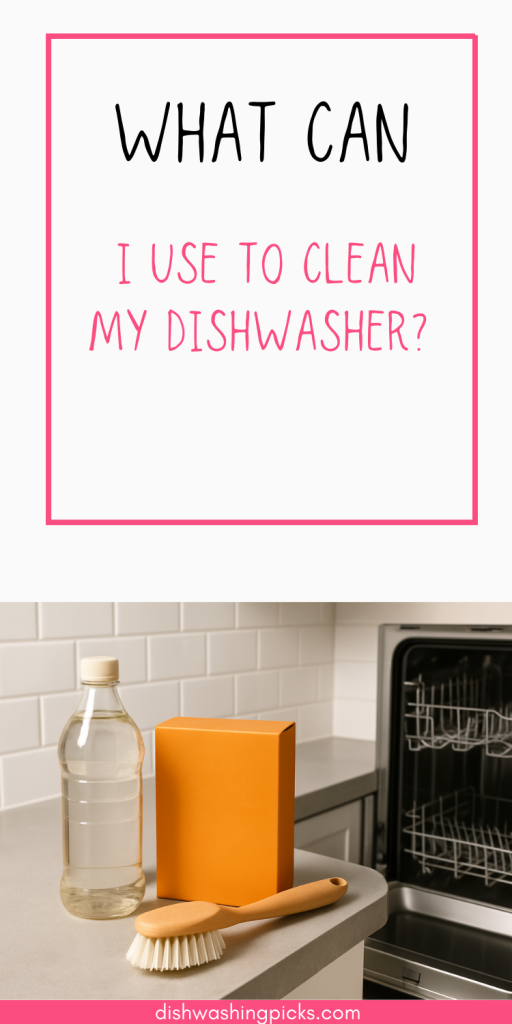
Okay, here’s a confession: when was the last time you actually gave your dishwasher a proper cleaning? I mean, we expect this trusty kitchen sidekick to wash everything from our spaghetti-stained plates to those crusty pizza pans without a hitch. But, guess what? Your dishwasher gets dirty too. Surprised? Yeah, it’s not just a magical box that cleans itself while blasting water. If you’ve noticed funky smells, spots on your dishes, or even worse, the occasional weird black spot inside the machine, your dishwasher might be sending you an SOS.
So, what can you use to clean your dishwasher and keep it running like new? Grab a seat, and let’s chat about the simple stuff that works wonders.
Why Even Bother Cleaning Your Dishwasher?
Before we jump into what to use, let’s take a quick moment to understand why this matters. You might be thinking, “Isn’t it enough that it cleans my dishes?” Well, kinda — but not really. Over time, food particles, soap scum, grease, and minerals from water build up inside your dishwasher. This gunk doesn’t just smell bad—it can clog up the spray arms, reduce water flow, and even mess with the heating element.
Picture this: you open your dishwasher after a cycle and the inside smells like a swamp or your dishes have weird spots. Gross, right? That’s your dishwasher begging for some TLC. Plus, regular cleaning helps avoid mold and mildew growth, which nobody wants hanging around their clean plates.
The Everyday Cleaning Heroes
So, you’re probably wondering, “What’s the easiest, most effective way to clean my dishwasher without buying a bunch of fancy stuff?” Glad you asked! Here are some household staples and a few easy tricks to keep your dishwasher fresh.
1. White Vinegar — Your Dishwasher’s Best Friend
White vinegar is basically the Swiss Army knife of cleaning. It’s cheap, natural, and incredibly effective. Pour a cup of white vinegar into a dishwasher-safe bowl and place it on the top rack. Then run a hot cycle. The vinegar cuts through grease, loosens mineral deposits, and even kills off bacteria. It’s like a reset button for your dishwasher.
2. Baking Soda — The Freshness Booster
Once you’re done with the vinegar cycle, sprinkle about a cup of baking soda on the bottom of the dishwasher and run a short hot cycle. This helps remove stains and deodorizes the inside. Baking soda’s mild abrasiveness makes it perfect for scrubbing away grime without damaging anything.
3. Lemon Juice — When You Want to Smell Like a Citrus Grove
If you’re not a fan of vinegar’s sharp scent, lemon juice is a great alternative. It’s natural, smells fresh, and works much like vinegar to break down buildup. Pour a cup on the bottom or in the detergent tray and run a hot cycle. You can even toss in a fresh lemon peel for extra zest!
4. Dishwasher Cleaning Tablets or Powders
Not into DIY cleaning? No worries. There are tons of commercial dishwasher cleaners out there designed specifically to dissolve grease and lime buildup. Just pop one in and run a cleaning cycle. These products are handy if you want a no-fuss option.
Don’t Forget the Nooks and Crannies
Cleaning your dishwasher isn’t just about running vinegar or tablets through a cycle. The devil’s in the details, folks. Here are some spots that need a little extra love:
- The Filter: Most dishwashers have a filter near the bottom that traps food particles. If you ignore this, it clogs and stinks. Pop it out (most filters twist or lift out easily) and rinse it under hot water. Scrub gently if it’s grimy.
- The Spray Arms: Sometimes, holes in the spray arms get clogged with mineral deposits or bits of food. Check them out and clear out any blockages with a toothpick or small brush.
- Door Seals and Gaskets: Mold loves to hang out on rubber seals around the door. Wipe them down regularly with a cloth soaked in vinegar or warm soapy water. Bonus: this helps prevent mildew smells.
- Detergent Dispenser: Sometimes old detergent builds up or clogs the dispenser flap. Give it a quick wipe or soak in warm water.
How Often Should You Clean Your Dishwasher?
Good question! Ideally, you want to give your dishwasher a deep clean about once a month if you use it regularly. If you live in an area with hard water (you know, that annoying stuff that leaves white spots everywhere), you might want to clean it more often to prevent mineral buildup.
Between deep cleans, just keep an eye (and nose) out for any weird smells or grime, and do a quick wipe-down of seals and filters. Keeping on top of it means less elbow grease later.
Bonus Tips for Keeping Your Dishwasher Happy
- Run Hot Cycles: Using the hottest water setting regularly helps kill bacteria and dissolve grease.
- Rinse Plates: Scrape off big food chunks before loading. Less food in the dishwasher means less gunk buildup.
- Leave the Door Ajar: After a cycle, crack the dishwasher door open to let moisture escape. Mold hates dry air.
- Use the Right Detergent: Cheap detergent might save you pennies but can cause buildup. Try to stick with reputable brands.
Wrapping It Up
So, there you have it! Cleaning your dishwasher is pretty straightforward and doesn’t require any special magic potions. A little vinegar, baking soda, some lemon juice, or a cleaning tablet every now and then, plus regular attention to filters and seals, keeps your dishwasher fresh, odor-free, and working like a champ.
Now, tell me—what’s your dishwasher cleaning routine? Or maybe you’ve got a funny story about a dishwasher disaster? Spill the tea! Because honestly, nobody’s perfect when it comes to kitchen chores.
Want me to help with other kitchen cleaning hacks or dishwasher maintenance tips? Just say the word!
